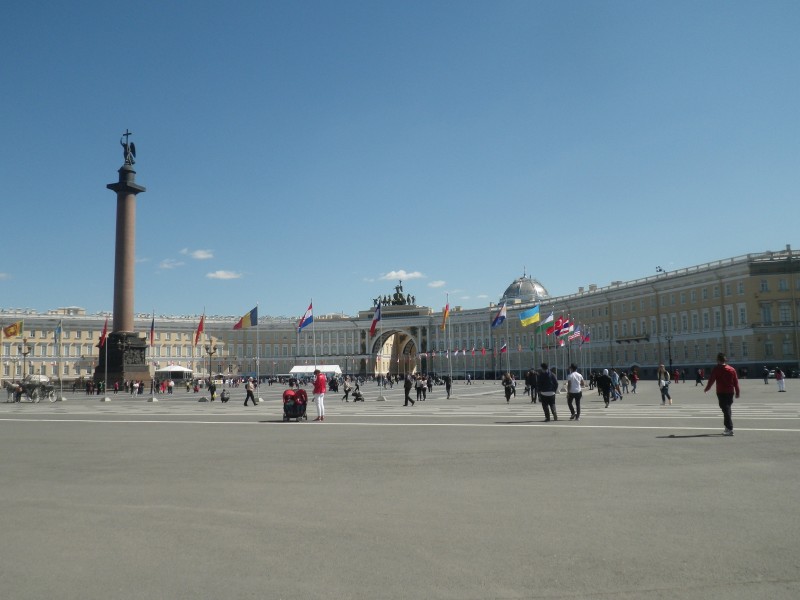GeoHAB 2019 - St Petersburg
Tabitha Pearman
NOC Southampton

As I looked through the thick dull panelled window of the plane I could see dense forest and the glittering gold bulbs of cathedrals. A few months ago I had been trundling along the tube, having travelled to London for my visa. Now the plane was touching down in St. Petersburg, Russia the venue for the GeoHAB conference 2019.
GeoHAB (marine geological and biological habitat mapping) is an international association of scientists studying geology, biology, archaeology and physical oceanographic processes in relation to benthic mapping. The conference comprises presentations, a workshop and working groups with the aim of exchanging ideas and facilitating interdisciplinary research that underpins effective mapping and spatial management. Each year the annual conference rotates between host countries and this year the conference was hosted by the A.P Karpinsky Russian Geological Research Institute (VSEGEI) in St. Petersburg, Russia.
GeoHAB is the major conference for my research that focusses on integrating novel technologies and methodologies in the interdisciplinary research of deep-sea submarine canyon habitat mapping. Thanks to the financial support of The Challenger Society I was able to attend the GeoHAB 2019 conference.
The conference kicked off with the workshop focusing on geomorphological interpretation and analysis. That evening the Russian themed ice breaker took place providing the perfect opportunity to start meeting people. The following day the presentations began covering the various disciplines of benthic mapping. My presentation was on the Wednesday and addressed the modification of the seabed morphology as a result of bottom trawling, and its impacts on epibenthic species assemblages found on coral mound features within a Marine Conservation Zone. These mound features represent relict coral reefs and an understanding of the species assemblages they support and how this relates to mound morphology is fundamental toward their mapping and future management. The talk went well despite a technical issue that meant the presentation froze and I had to complete it without slides! This involved a lot of hand waving! The end of the week closed with a field trip to see local sights and network.
The conference was a great experience, not only did I learn and receive advice on implementing the latest approaches to mapping, but I also made many new friends and contacts. I am very grateful to The Challenger Society for enabling me to attend the GeoHAB 2019 conference.
I am a third year PhD student at the National Oceanography Centre, Southampton University. My research focusses on interdisciplinary mapping of deep-sea submarine canyon habitats. The emphasis lies on developing end products for marine management of cold-water coral habitats and elucidating the underlying ecological process generating spatial patterns in their distributions.
Latest News
Royal Society Publishing Photography Competition 2025
Please see a message from the Royal Society below:
We are delighted to announce that the 2025 Competition is now open for entries until 15 August for a chance to win £1000! The competition celebrates the power of photography in conveying the wonder of science happening all around us and photographs can be submitted in the categories of: Astronomy, Behaviour, Earth Science and Climatology, Ecology and Environmental Science, and Microimaging.
The competition is free to enter and open to anyone studying or working in science at graduate level or above. Category winners will receive a one-year membership to the Royal Photographic Society and the overall winner will receive a grand prize of £1,000. Find out more: https://bit.ly/RSPphotocomp
October 2025 MEDIN Workshop: Marine Data Management, Governance and the MEDIN toolset
The Marine Environmental Data and Information Network (MEDIN) are pleased to announce that registration is now open for the next occurrence of our popular free online training workshop: ‘Marine Data Management, Governance and the MEDIN toolset’ on the 13th – 17th October 2025 on OceanTeacher Global Academy.
Marine Data Management, Governance and the MEDIN toolset
The Marine Environmental Data and Information Network (MEDIN) and OceanWise are delighted to invite you to attend our popular free online training workshop: ‘Marine Data Management, Governance and the MEDIN toolset’ on the 19th – 23rd of May 2025.
